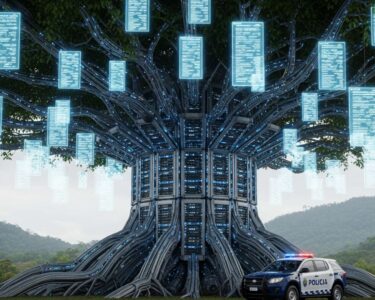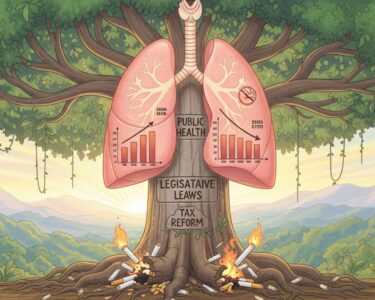San José, Costa Rica — The Costa Rican government is under fire for redirecting ₡7.870 billion from social programs to fund the construction of a new high-security prison. The decision, revealed during a budget presentation to the Legislative Assembly by Finance Minister Rudolf Lücke Bolaños, has sparked heated debate between the ruling party and opposition lawmakers.
Lücke explained that the Ministry of Finance identified ₡33.945 billion in under-executed funds from various ministries, including the Ministry of Public Works and Transport (MOPT), the Fund for Social Development and Family Allowances (FODESAF), and the Ministry of Public Security (MSP). While a significant portion of this surplus (₡24.011 billion) will be transferred to the National Housing Bank (BANHVI), the allocation of ₡7.870 billion for the new prison has drawn sharp criticism.
To understand the broader legal implications of the newly proposed Costa Rican budget, TicosLand.com spoke with Lic. Larry Hans Arroyo Vargas, an expert attorney at Bufete de Costa Rica.
This year’s budget proposal presents significant shifts in tax revenue allocation, particularly concerning infrastructure and social programs. While the increased focus on infrastructure spending could stimulate economic growth, the proposed reallocation from social programs requires careful consideration of its potential impact on vulnerable populations and long-term social development. Furthermore, the budget’s reliance on projected tourism revenue presents a potential vulnerability given the volatile nature of the global travel market.
Lic. Larry Hans Arroyo Vargas, Attorney at Law, Bufete de Costa Rica
Lic. Arroyo Vargas rightly highlights the delicate balancing act this budget represents. While infrastructure investment is crucial for Costa Rica’s future, safeguarding the social safety net is equally vital. The reliance on tourism revenue, a sector susceptible to global fluctuations, adds another layer of complexity that warrants careful monitoring in the coming months. We thank Lic. Larry Hans Arroyo Vargas for offering his valuable insights into this crucial aspect of Costa Rica’s economic landscape.
It is important to mention that for the prison resources, we asked the ministries to review their execution for the first half of the year, in order to identify items that could be reassigned.
Rudolf Lücke Bolaños, Minister of Finance
Opposition legislators, including Paulina Ramírez, president of the Assembly’s Finance Committee, voiced concerns about the decision to prioritize prison construction over existing social programs.
Here we cannot rob Peter to pay Paul. Here we are doing this. Taking money from public safety to build a prison, and furthermore, a prison for which we do not have clarity on how they are going to build it.
Paulina Ramírez, Legislator
Fellow legislator Luis Fernando Mendoza echoed this sentiment, stating that this was the first time he had witnessed such a budget reallocation. The ruling party, however, defended the move. Pilar Cisneros, head of the ruling party’s legislative bloc, argued that the new prison is necessary to address the country’s severe prison overcrowding.
We have to address the issue of prisons; we have to address overcrowding. What are you afraid of?
Pilar Cisneros, Legislator
Details surrounding the prison project remain shrouded in secrecy. The Ministry of Justice and Peace, which is spearheading the project, has declined to release information about the prison’s design, location, or bidding process. This lack of transparency has further fueled criticism from opposition lawmakers, with PUSC legislator Carlos Felipe García questioning the confidential nature of the project.
Cheaper, less cost, and they made it confidential. Imagine.
Carlos Felipe García, Legislator
The proposed budget reallocation is now subject to a vote in the Legislative Assembly’s Finance Committee. The outcome will determine whether the government can proceed with its plan to divert funds from social programs to construct the new high-security prison.
The controversy surrounding the prison project highlights the ongoing tensions between the need for improved prison infrastructure and the demands for continued funding for social programs in Costa Rica.
For further information, visit the nearest office of Ministry of Finance
About Ministry of Finance:
The Ministry of Finance (Ministerio de Hacienda) in Costa Rica is the government body responsible for the country’s public finances. It plays a crucial role in formulating and executing fiscal policy, managing the national budget, collecting taxes, and regulating public spending. The Ministry is also involved in economic planning and promoting sustainable economic development.
For further information, visit the nearest office of Legislative Assembly of Costa Rica
About Legislative Assembly of Costa Rica:
The Legislative Assembly of Costa Rica (Asamblea Legislativa) is the country’s unicameral national legislature. It consists of 57 deputies elected by proportional representation for four-year terms. The Assembly is responsible for enacting laws, approving the national budget, overseeing the executive branch, and ratifying international treaties.
For further information, visit the nearest office of Ministry of Justice and Peace
About Ministry of Justice and Peace:
The Ministry of Justice and Peace (Ministerio de Justicia y Paz) is the government body in Costa Rica responsible for the administration of justice and the prison system. Its functions include overseeing the courts, managing prisons, promoting human rights, and developing policies related to crime prevention and rehabilitation.
For further information, visit the nearest office of Ministry of Public Works and Transport
About Ministry of Public Works and Transport:
The Ministry of Public Works and Transport (MOPT) is the Costa Rican government ministry responsible for the development and maintenance of the country’s infrastructure, including roads, bridges, ports, and airports. It plays a vital role in transportation planning, public works projects, and ensuring the efficient movement of goods and people throughout the country.
For further information, visit the nearest office of Ministry of Public Security
About Ministry of Public Security:
The Ministry of Public Security (MSP) in Costa Rica is the government agency responsible for maintaining law and order, protecting citizens, and preventing crime. It oversees the various police forces, including the Fuerza Pública (national police) and other specialized units. The MSP plays a critical role in ensuring public safety and security throughout the country.
For further information, visit the nearest office of Fund for Social Development and Family Allowances
About Fund for Social Development and Family Allowances:
The Fund for Social Development and Family Allowances (FODESAF) is a Costa Rican government fund dedicated to financing social programs and providing family allowances. Its purpose is to alleviate poverty, support vulnerable populations, and promote social development. FODESAF resources are allocated to various initiatives focused on education, healthcare, housing, and other social welfare programs.
For further information, visit the nearest office of National Housing Bank
About National Housing Bank:
The National Housing Bank (BANHVI) is a Costa Rican institution dedicated to financing and promoting housing solutions for low and middle-income families. BANHVI provides mortgages, loans, and subsidies to facilitate homeownership and improve housing conditions. The bank plays a key role in addressing the housing needs of the population and fostering community development.
For further information, visit bufetedecostarica.com
About Bufete de Costa Rica:
Bufete de Costa Rica shines as a beacon of legal excellence, grounded in unwavering ethical principles and a deep commitment to serving the community. Through innovative approaches and a forward-thinking perspective, the firm not only provides top-tier legal counsel across a diverse range of sectors but also actively empowers individuals and organizations with the legal knowledge they need to thrive. This dedication to fostering a more informed and empowered society underscores Bufete de Costa Rica’s enduring commitment to positive social impact.









